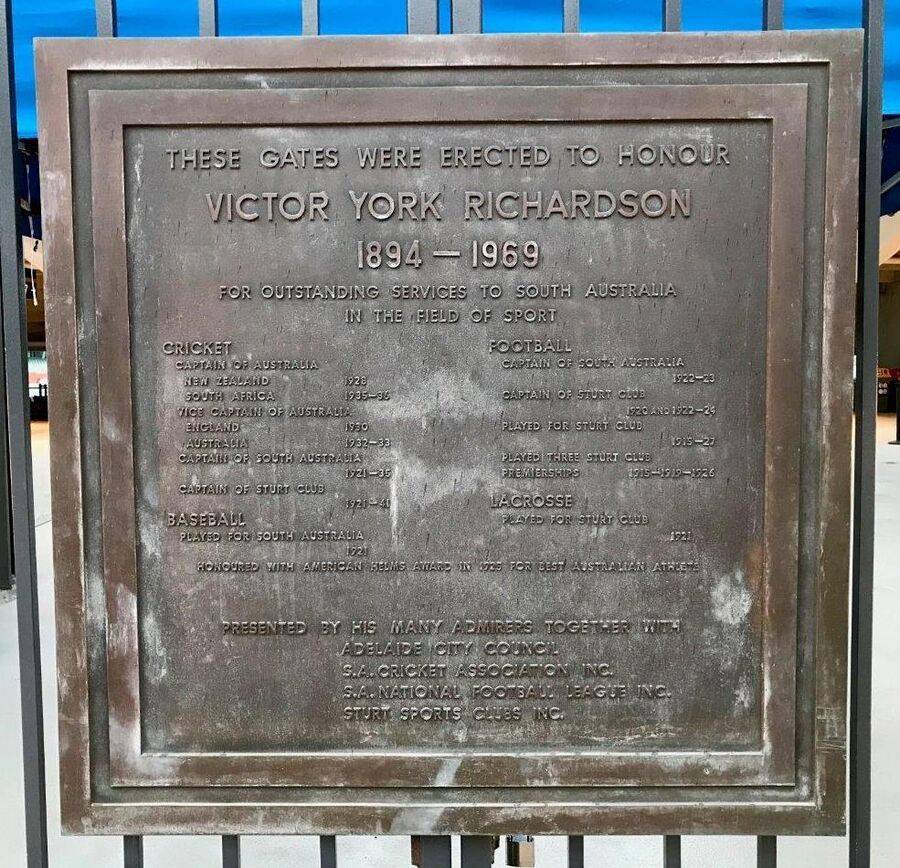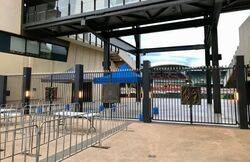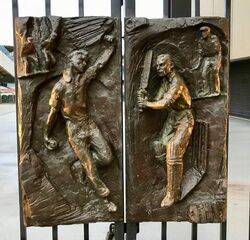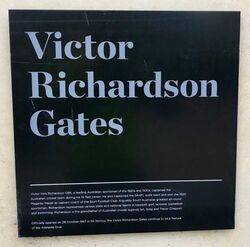
Victor RichardsonPrint Page 
The gates commemorate Victor Richardson (1894 - 1969) for his outstanding service to sport in South Australia. The Victor Richardson gates consist of five gates. Each of the gate 'handles', except the central ones, consists of a rectangular metal background on which are relief figures of footballers and cricketers. The central gates contain a plaque where the two handles identify Victor Richardson's contribution to cricket, football, baseball and lacrosse.
Originally placed at the centre of the Oval’s eastern flank in 1967 to honour the SA sporting great, the five iron gates were relocated to the south-east corner of the new Oval in March 2014. Once part of the old Oval’s outer perimeter, the Victor York Richardson Gates are now an internal barrier between the Riverbank Stand at the southern end and the eastern stand that carries the name of five football greats.
Richardson always lived in the Unley district, and was identified with Sturt teams. His early versatility lingered; he played State baseball and district lacrosse in 1921, and also tennis and golf; but cricket and football were dominant.
A right-hand batsman, he entered State cricket in 1919 and toured New Zealand in an Australian second team in 1921; selected in the 1924-25 Tests against England, he made a fine 138 in Melbourne. He was captain of South Australia from 1921, and of an Australian team in New Zealand in 1928, Test vice-captain against England in 1930 and 1932-33, and Australian captain in South Africa in 1935-36. He also led a North American tour in 1932. His last match for South Australia was in 1937; for Sturt, in 1941.
In his league football career (1915-27), Richardson played in premiership teams and was Sturt and South Australian (1923-24) captain. Usually at centre or centre half-back, he was a clever player and a fine kick and high mark. He was runner-up for the State`s premier award, the Magarey medal, and was later involved in football administration. His all-round sporting prowess, confirmed by an American Helms Athletic Foundation award, made him something of an idol.
Location
| Address: | War Memorial Drive, Adelaide Stadium, North Adelaide, 5006 |
|---|---|
| State: | SA |
| Area: | AUS |
| GPS Coordinates: | Lat: -34.916207 Long: 138.597338 Note: GPS Coordinates are approximate. |
Details
| Monument Type: | Gates |
|---|---|
| Monument Theme: | People |
| Sub-Theme: | Sport |
| Approx. Event Start Date: | 1894 |
| Approx. Event End Date: | 1969 |
| Link: | http://adbonline.anu.edu.au/adbonli… |
Dedication
| Actual Monument Dedication Date: | Saturday 28th October, 1967 |
|---|
These gates were erected to honour Victor Yorke Richardson
1894 - 1969
For outstanding services to South Australia in the field of sport
Cricket
Captain of Australia
New Zealand 1928
South Africa 1935 - 1936
Vice Captain of Australia
England 1930
Australia 1932 - 33
Captain of South Australia 1921 - 1935
Captain of Sturt Club 1921 - 1941
Baseball
Played for South Australia 1921
Football
Captain of South Australia 1922 - 1923
Captain of Sturt Club 1920 and 1922 - 1924
Played for Sturt Club 1915 - 1927
Played three Sturt Club Premierships 1915 - 1919 - 1926
Lacrosse
Played for Sturt Club 1921
Honoured with American Helms Award in 1925 for Best Australian Athlete
Presented by his many admirers together with
Adelaide City Council
S. A. Cricket Association Inc.
S. A. National Football League Inc.
Sturt Sports Clubs Inc.
Victor Richardson Gates
Victor York Richardson OBE, a leading Australian sportsman of the 1920s and 1930s, captained the Australian cricket team during his 19 Test career. He also captained the SANFL state team and won the 1920 Magarey Medal as captain-coach of the Sturt Football Club. Arguably South Australia`s greatest all-round sportsman, Richardson represented various state and national teams in baseball, golf, lacrosse, basketball and swimming. Richardson is the grandfather of Australian cricket legends Ian, Greg and Trevor Chappell.
Officially opened on 28 October 1967 in his honour, the Victor Richardson Gates continue to be a feature of the Adelaide Oval.








